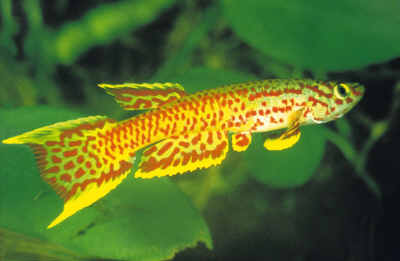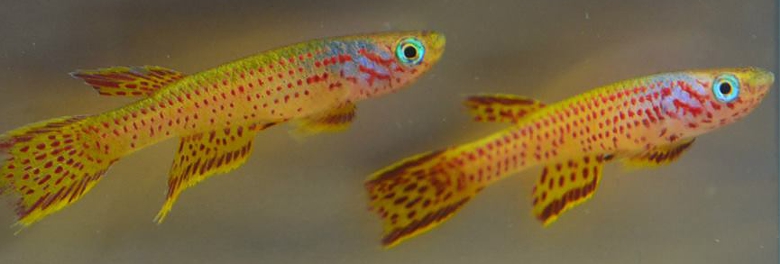Aphyosemion lefiniense Woeltjes 1984

A.lefiniense Brazzaville
distributed as A.spec.Brazzaville around
1979/80.
Photo courtesy of Ed Pürzl.
Aphyosemion lefiniense Woeltjes 1984

A.lefiniense Brazzaville
distributed as A.spec.Brazzaville around
1979/80.
Photo courtesy of Ed Pürzl.
| Meaning of Name |
After the Lefini River, (or the village La Lefini) the area of the type locality. |
||||||
| First Description |
Woeltjes T. 1984. Aphyosemion lefiniense spec. nov. (Pisces, Atheriniformes, Rivulinae) aus dem Lefini Subsystem des Kongo-Flusses in der Volksrepublik Kongo. DKG Journal 16 (1): 3-14, 6 figures, 2 maps. |
||||||
| Size |
5 cm |
||||||
| Meristics |
D = 8-10, A = 13-16, D/A = +9-11, ll = 27-30(+2-3) (Woeltjes 1984). |
||||||
| Karyotype |
|
||||||
| Sub-Genus |
Aphyosemion |
||||||
| Group |
elegans |
||||||
| Synonyms |
|
||||||
Populations
|
 A.lefiniense Wild caught fish from the Lefini River Photo courtesy of Serge Mevellec
A.spec.Brazzaville - First reported in
BKA literature in BKA newsletter 180, August 1980. Maintained in Europe
originally in 1979 but crossed the channel into the UK around 1979/80.
They were originally known as A.aff.elegans
Brazzaville but were distributed in the UK as A.spec.Brazzaville.
This population was recognised by having large yellow outer margins
in unpaired fins. UK breeders found them easy to breed & they were
listed in the Species Maintenance Programme of 1980/81 by 3 members.
Sex ratio was reported to be 3-4 to 1 in favour of males. CI 96 - Perhaps the most widespread population from a commercial import. Still doing well in mainland Europe in 2002. La Léfini - Type location (see below). |
||||||
| Type Locality |
CHP 82 / 15. Close to the village of La Lefini situated
immediately south of the Lefini River. A small pool next to a fast flowing
brook 200 km north of Brazzaville, eastern Congo. This locality was small ponds about 15 cm deep & 1·5 metres square. These ponds lied alongside a fast flowing stream 2 metres deep which eventually emptied into the Lefini River. The bed of these ponds was covered with leaves. Also collected was E.multifasciatus. This locality was designated the code reference CHP 82/15. This locality (apart perhaps from sp.Brazzaville) is the only known wild collection where an exact point of capture can be established (2002) |
||||||
| Distribution |
Although they are only known from the type locality a similar Aphyosemion has been collected southeast of Kinshasa. Also, the population called 'Brazzaville' (collected west of Brazzaville?) which is considered as an aquarium strain, may also be A.lefiniense. This was collected 30 km to the west of Brazzaville. |
||||||
| Habitat |
Presently only known from a small pool next to a fast flowing brook. This may be a flood pool for this river. |
||||||
| Distinguishing Characteristics | The
caudal fin is noticeably more elongate than other species in the group.
The Lefini population has wide red sub-marginal bands in the un-paired
fins. Also, this sp. has wide yellow outer margins to unpaired fins of adult males. This is also a characteristic of the fish known as 'sp.Brazzaville'. |
||||||
| Colour/Pattern Variability | Presently
low but this may alter if their area of distribution is found to be larger. Easily seperated from others in the elegans group by the elongated caudal fin. This is also common in christyi but with lefiniense there is a wide outer margin of yellow with a submarginal band of red which variea in thickness between individuals to the point where it can be quite thick (sometimes thicker than the outer band. This red band may be virtually absent in some individuals. Paratype No.4 has no red band in the anal fin & a very broken band in the caudal. Paratype No.6 has a strong showing of red bands in both fins. |
||||||
| History |
Discovered by Jan Pap & Huub Heltzel in 1982 about 200 km from Brazzaville near the village of La Lefini. Collected later in 2005 by members of MRAC (Royal Museum of Central Africa). |
||||||
| Breeding Notes |
Regarded as one of the more difficult species of the elegans group to breed. Permanent setups have been used successfully, netting young fish out of the breeding tank & growing them on in seperate aquaria. Water incubation is 12-14 days. Sexual maturity is slow at around 7 months. |
||||||
| Diameter of Egg | |||||||
| Remarks |
In future re-classifications A.lefiniense may find itself a synonym of A.schioetzi. |